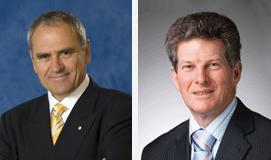An economic plan that discounts environmental factors is worthless. This is the message coming from Australian Treasury chief Ken Henry, but it’s not getting through closer to home. [13 July 2010 | Peter Boyer]
“Development which does not respect conservation is not development at all. Conservation safeguards a substantive freedom — a freedom to have and to preserve for future generations something that we value and to which we have reason to attach importance.”
No, this isn’t Bob Brown speaking, nor anyone from the conservation movement. It’s that economic hard man Ken Henry, Secretary of the Australian Treasury, in an address at the Weereewa Festival at Lake George, near Canberra, three months ago.
Dr Henry has been talking quite a bit lately about conservation and sustainability. He told delegates to a Brisbane business leaders’ forum last October that climate change and our response to it would massively influence the future of the Australian economy, which could amount to “the largest structural adjustment in our economic history”.
In a speech in March this year, Dr Henry sought to stir discussion about how we measure the value of our natural environment. “We’ve made a start. But it’s only a start. Much more needs to be done if we are to be able to say that the wellbeing of future generations is not to be threatened by poor valuation of the environment.”
No-one should be surprised by this. Former World Bank chief economist Nicholas Stern and Australia’s Ross Garnaut are among the rapidly-growing ranks of senior economists who see climate change as a gigantic market failure demanding the full attention of those charged with keeping economies in good shape.
Another factor is the certainty of rising oil scarcity in the wake of the impending, inevitable peak in global oil production. As we probe ever-deeper for oil, we face more disasters such as that now wreaking havoc on a vast marine habitat and the livelihoods of millions of people, and threatening to ruin one of the world’s biggest companies.
The Gulf of Mexico calamity brings home to us that economy and ecology should never be separated. The time is past when the guardians of our wealth, those in charge of our national and state treasuries, could treat conservation of our natural environment as someone else’s problem. As Ken Henry has recognised, it’s their problem too — very likely their biggest.
The heads of treasuries around Australia have always been uniquely powerful public servants. While their ministers come and go, they tend to stay put. They’re the ones best placed to deliver that essential underpinning of good government, a firm handle on the economy. So treasurers tend to look after their agency heads.
In Tasmania we’re about to see a rare changing of the guard, with Don Challen announcing his departure in October after 17 years as Treasury Secretary. But as well as the usual friendly accolades, he’s copped a bit of a hammering for his apparently expensive retirement plans.
Such a reception would have been unthinkable in the days when warm applause, a gold watch and a gong were the rewards for distinguished public service careers. In those times, “retirement” meant what it said. Some retiring public servants filled a few hours a week on government boards, but most of them, like everyone else, simply stopped working and took up their pension.
Those times are gone. In recent years Tasmanians can recall the well-remunerated and rather prolonged “departures” of Mark Addis (former head of Infrastructure, Energy and Resources), Scott Gadd (Environment) and Evan Rolley (Forestry Tasmania).
None of these public servants (count Forestry Tasmania as an arm of government) is getting anything like the kind of largesse that’s been going to retiring private sector CEOs, some of whom seem to regard a $10 million payout as mean-spirited, but in the small Tasmanian pond their retirement payments have a larger financial impact.
The current debate has put a spotlight on Don Challen’s stewardship at Treasury. Premier David Bartlett praised his contribution to public administration and his guidance through the global financial crisis, for which he doubtless deserves credit. But there’s another aspect of his role as Treasury Secretary which, in the circumstances, we shouldn’t shy away from.
For all the reasons that Henry, Garnaut, Stern and many others have explained, the state of the environment has big consequences for economic management. Tasmania’s “clean, green” branding adds another layer to this. Just as Ken Henry is wrestling with costing climate change and environmental health for Australia, so should Don Challen be doing the same for Tasmania.
While mentioning Tasmanian contributions to national studies, recent State Treasury annual reports leave the impression that climate and energy futures aren’t exactly core business. The energy-saving efforts of the internal climate change working group are laudable, but such commitment and effort needs to happen right at the top and be applied to the wider economy.
Despite its considerable research capacity, there’s no sign of any Treasury study of the economic implications of climate and energy constraints for Tasmania, nor any other indication that the agency’s leadership has grasped the bigger picture. There’s a lot of ground to make up here.
If a Don Challen post-retirement consultancy can produce a solid, workable costing and funding blueprint for meeting our energy and climate challenges in the decades ahead, he’ll have earned his keep. If he doesn’t see the value or relevance of this, he should keep his slippers on and save us the money.

